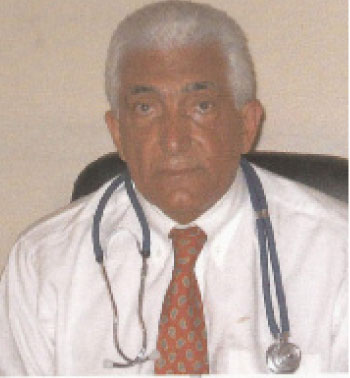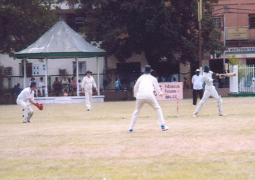
Change is possible with the right treatment and support, and by addressing the root cause of your addiction. Don’t give up-even if you’ve tried and failed before.
The road to recovery often involves bumps, pitfalls, and setbacks. But by examining the problem and thinking about change, you’re already on your way.
Dr Hassan Azadeh, our health adviser, a senior lecturer at the University of The Gambia and Mr Lamin Hassan, an ex-drug user and complete clean out of any drugs at all and chair person of the Organisation of Second Chance The Gambia advice everyone who is harmfully taking any drugs how to stop and how to get back to a healthy life as Lamin Hassan and now lives a very healthy life.
The Point: So Lamin tell us about your experience taking harmful drugs?
Lamin: Despite the harmful effects of cigarette smoking and drug abuse, the rate at which people, especially young people in The Gambia are indulging in this very harmful habit is alarming.
Today, it is common to see teenagers smoking cigarette, marijuana, even in their uniforms or an adult smoking in the midst of others, especially children.
Researches done in other countries have proven that many people start smoking/abusing drugs due to their little or no knowledge of the harmful effects on themselves and the society as a whole.
Therefore, there is an urgent need for the implementation of ongoing awareness activities in schools, communities, on radio, TV etc in order to discourage smoking/drug abuse in the Gambia.
Below are some of the effects of smoking cigarette and the commonly used drugs in The Gambia:
CIGARETTE:
·
Causes impotency, emphysema and different types of cancers, such a cancer of the lungs, brain, penis, spinal cord, nerves, fallopian tubes, uterus, ejaculatory dusts, muscle and many more….
· It makes it hard for women to get pregnant
· Birth defects, like a cleft/divided lip or cleft palate/roof of the mouth.
Some of these diseases can be cured when discovered during the early stages. Unfortunately, in Africa, most people only go for check up when they start feeling of seeing the symptoms.
SECOND HAND/PASSIVE SMOKING:
This means breathing in smoke from other people’s cigarette, cigar, or pipes etc. This type of smoking also very harmful, especially to children:It is link to asthma, reduced immunity, pneumonia, bronchitis, S.I.D (Reduced infant death syndrome etc)
It has been proven that if you smoke cigarette around children from birth, by age 5, they’ll have inhaled over one hundred (100) packs which is enough to course cancer and other deadly deceases.
SMOKING YOUR CHOICE NOT THERE!!
Marijuana/Cannabis: Though it is sometime use for medical purposes, but when it is being over used, its negative effects are very harmful.
Smoking cannabis like many other drugs that are usually prescribed for people has primary and secondary effects.
The primary effects of cannabis last for 2-4 hours, while the secondary effects last for about three months.
Therefore, because people who smoke cannabis always like to maintain the primary effects, they continue smoking it more frequently and as a result it affects the cells in their lungs, which eventually leads to cancer.
DO YOU STILL WANT TO SMOKE CANABIS?
Due to the limited space available for this article, we are only going to consider the nature and secondary effects of the drugs listed below:
Rivotril: Commonly known in The Gambia as roch; It belongs to the class of medications called benzodiazepines. In general, benzodiazepines are used as a sedative or to decrease seizures or anxiety. It is used to treat seizure disorders. It helps by slowing the activity of the nerves in the brain (i.e., the central nervous system).
What side effects are possible with Rivotril?
The side effects listed below are not experienced by everyone who takes this medication.
clumsiness or unsteadiness
delayed reaction
dizziness or lightheadedness
drowsiness
increased watering of the mouth
muscle weakness
unusual tiredness or weakness
Researchers have proven that this drug is more addictive than heroin and cocaine. Therefore, people who are addicted to these types of drugs are advised not to stop suddenly but to do it gradually, under the supervision of a doctor to prevent/minimize the withdrawal symptoms such as seizures, irritability, nervousness, sleep problems, agitation, tremors, diarrhea, abdominal cramps, vomiting, memory impairment, headache, muscle pain, extreme anxiety, tension, restlessness, and confusion.
Cocaine use and its negative effects:
Cocaine is a purified extract from the leaves of the Erythroxylum coca bush. This plant grows in the Andes region of South America. Different chemical processes produce the two main forms of cocaine:
Powdered cocaine -- commonly known on the street as “coke” or “blow” -- dissolves in water. Users can snort or inject powdered cocaine.
Crack cocaine -- commonly known on the street as “crack” or “rock” -- is made by a chemical process that leaves it in its “freebase” form, which can be smoked.
Cocaine acts in the deep areas of the brain. These are the areas that reward us for “good behavior” -- those activities that lead to food, sex, and healthy pleasure. Stimulating this brain area with cocaine feels good. And it can create a powerful craving to use more cocaine. Repeated cocaine use leads to tolerance (that is, increasingly higher doses are needed to attain the same effect), dependence, and addiction.
There is no “safe” frequency of use for cocaine. It’s impossible to predict whether a person will become physically or psychologically dependent on cocaine.
A single use of cocaine is enough for someone to be addicted for a life time.
Using cocaine can lead to:
Heart attack
Stroke
Kidney failure
Seizure and lead to bizarre or violet behavior etc
After using cocaine regularly for an extended period, dependence (addiction) develops. When dependence is present, stopping cocaine suddenly leads to withdrawal. Symptoms of withdrawal from cocaine are more psychological than physiological. Typically, cocaine withdrawal symptoms include:
depression and anxiety
fatigue
difficulty concentrating
inability to feel pleasure
increased craving for cocaine
physical symptoms including aches, pains, tremors, and chills
Typically, withdrawal symptoms from cocaine addiction resolve within one to two weeks.
However, intense craving for cocaine may return, even years after the last use.
Heroine and its secondary effects:
Overdose: The most serious health effect of heroin use is the possibility of death due to accidental overdose.
Because heroin is an illegal drug and can be handled and cut (mixed with other ingredients) by various suppliers before it reaches street-level users, those who use the drug never know how potent or pure the heroin they are using is until they use it.
Heroin is often mixed with sugar, starch, quinine, and sometimes, strychnine or other poisons, adding other potential dangers. Because of the unknown strength and actual contents of the heroin they are taking, users are at a great risk of overdose and death.
Addiction
Another dangerous effect of heroin use is the highly addictive nature of the drug. All heroin users, even those who only snort or smoke the drug can become addicted with repeated use.
Over time, heroin users develop a tolerance for the drug requiring them to use increasingly larger amounts to achieve the same feeling they experienced when they first began to use.
After a while, the tolerance level to the drug rises to the level that heroin use in any amount stops producing the euphoric effect the user once experience altogether. When this occurs, the addict continues to seek and take the drug just to feel “normal.” They become physically dependent upon the drug.
Using heroine can course infection of the heart lining and valves, liver disease, Kidney disease, Pulmonary complications, which are often infection related, Skin infections and abscesses, especially among chronic injectors who suffer scarred or collapsed veins
In addition to the risk of contracting the hepatitis virus, heroin users also have an increased risk of catching human immunodeficiency virus (HIV) and other blood-borne viruses.
Conclusion:
When you consider the income that people generate from selling cigarette and drugs, such as marijuana, Rivotril, commonly known as Rosh, heroin, cocaine and the likes, you will understand that the fight to discourage people above and my desire to see to it that drug addicts who are willilling to change for good should be giving the opportunity to do so, we have established a nonprofit organization called Second Chance the Gambia.
This organization seeks to engage stakeholders in implementing ongoing awareness programs on the causes and effects of crime and to provide ideal homes where drug addicts, alcoholics, victims, ex-prisoners, destitute and prostitutes will receive medical treatment, skill training and job opportunities that will enable them to successfully reintegrate into the wider society and become nation builders.
Our next project will kick start in June-December, God willing, and it is geared towards sensitizing the general public on the effects of smoking/drug abuse and to highlight the important role of schools, parents, teachers, students and the society as a whole in preventing/minimizing smoking and the abuse of drugs in The Gambia, especially among young people.
It is expected that at the end of this project, learning institution will engage in ongoing awareness activities within their schools/institution and the community as a whole.
Our goal is to establish a modern rehabilitation centre in The Gambia by 2015.
Reach out for support
Learn healthy ways to cope with stress
Keep triggers and cravings in check
Build a meaningful drug-free life
Don’t let relapse keep you down
Drug addiction treatment and recovery step 1: Decide to make a change
For many people struggling with addiction, the biggest and toughest step toward recovery is the very first one: deciding to make a change. It’s normal to feel conflicted about giving up your drug of choice, even when you realize it’s causing problems in your life. Change is never easy—and committing to sobriety involves changing many things, including:
The way you deal with stress
Who you allow in your life
What you do in your free time
How you think about yourself
You may wonder if you’re really ready for all that change or if you have what it takes to quit. It’s okay if you’re torn. Recovering from addiction is a long process, one that requires time, commitment, motivation, and support. As you contemplate your situation, the following tips can help you make the decision.
Thinking about change
Keep track of your drug use, including when and how much you use. This will give you a better sense of the role the addiction is playing in your life.
List the pros and cons of quitting, as well as the costs and benefits of continuing your drug abuse.
Consider the things that are important to you, such as your partner, your kids, your career, or your health. How does your drug use affect those things?
Talk it over with someone you trust. Ask the person how he or she feels about your drug use.
Ask yourself if there’s anything preventing you from changing. What are some things that could help you make the change?
Preparing for change: 5 key steps to addiction recovery
1. Remind yourself of the reasons you want to change.
2. Think about your past attempts at quitting, if any. What worked? What didn’t?
3. Set specific, measurable goals, such as a quit date or limits on your drug use.
4. Remove reminders of your addiction from your home and workplace.
5. Tell friends and family that you’re quitting and ask for their support.
Drug addiction treatment and recovery step 2: Explore your treatment options
Once you’ve made the decision to challenge your drug addiction, it’s time to explore your treatment choices. As you consider the options, keep the following in mind:
There’s no magic bullet or single treatment that works for everyone. When considering a program, remember that everyone’s needs are different. Drug addiction treatment should be customized to your unique problems and situation. It’s important that you find a program that feels right.
Treatment should address more than just your drug abuse. Addiction affects your whole life, including relationships, career, health, and psychological well-being. Treatment success depends on developing a new way of living and addressing the reasons why you turned to drugs in the first place. It may have been because of an inability to manage stress, in which case you’ll need to find healthy ways to handle stressful situations.
Commitment and follow-through are key. Drug addiction treatment is not a quick and easy process. In general, the longer and more intense the drug use, the longer and more intense the treatment you’ll need. But regardless of the treatment program’s length in weeks or months, long-term follow-up care is crucial to recovery.
There are many places to turn for help. Not everybody requires medically supervised detox or an extended stint in rehab. The level of care you need depends on your age, drug use history, and other medical or psychiatric conditions. In addition to doctors and psychologists, many clergy members, social workers, and counselors offer addiction treatment services.
As you seek help for drug addiction, it’s also important to get treatment for any other medical or psychological issues you’re experiencing. Your best chance of recovery is through integrated treatment for both the substance abuse problem and the mental health problem. This means getting combined mental health and addiction treatment from the same treatment provider or team.
Drug addiction treatment and recovery step 3: Reach out for support
Don’t try to go it alone. Whatever treatment approach you choose, having a solid support system is essential. The more positive influences you have in your life, the better your chances for recovery. Recovering from drug addiction isn’t easy, but with people you can turn to for encouragement, guidance, and a listening ear, it’s a little less tough.
Lean on close friends and family – Having the support of friends and family members is an invaluable asset in recovery. If you’re reluctant to turn to your loved ones because you’ve let them down before, consider going to couples counseling or family therapy.
Build a sober social network – If your previous social life revolved around drugs, you may need to make some new connections. It’s important to have sober friends who will support your recovery. Try taking a class, joining a church or a civic group, volunteering, or attending events in your community.
Consider moving in to a sober living home – Sober living homes provide a safe, supportive place to live while you’re recovering from drug addiction. They are a good option if you don’t have a stable home or a drug-free living environment to go to.
Make meetings a priority – Join a recovery support group and attend meetings regularly. Spending time with people who understand exactly what you’re going through can be very healing. You can also benefit from the shared experiences of the group members and learn what others have done to stay sober.
Drug addiction treatment and recovery step 4: Learn healthy ways to cope with
Even once you’ve recovered from drug addiction, you’ll still have to face the problems that led to your drug problems in the first place. Did you start using drugs to numb painful emotions, calm yourself down after an argument, unwind after a bad day, or forget about your problems? After you become sober, the negative feelings that you used to dampen with drugs will resurface. For treatment to be successful, and to remain sober in the long term, you’ll need to resolve these underlying issues as well.
Conditions such as stress, loneliness, frustration, anger, shame, anxiety, and hopelessness will remain in your life even when you’re no longer using drugs to cover them up. But you will be in a healthier position to finally address them and seek the help you need.
Further information email azadehhassan@yahoo.co.uk or call AFRI Radio every Wed from 9-9.30 pm or send text to DR AZADEH/LAMIN HASSAN.



